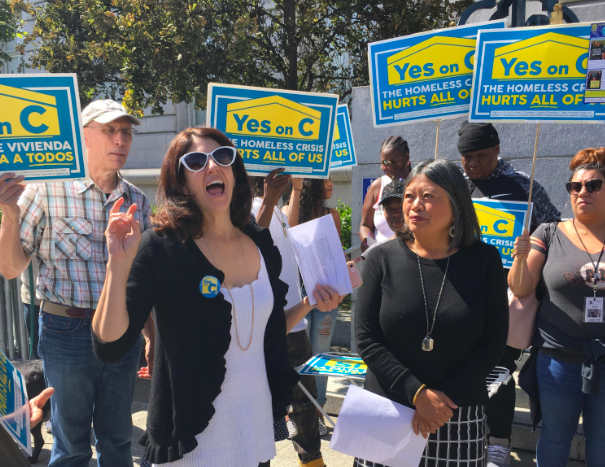When I was a young reporter at the Bay Guardian, the editor, Bruce Brugmann, told me not to bother writing stories about how “the left is in disarray.”
In this town, he said, the left is always in “disarray.” The progressives are energetic folks with a lot of passion and ambitious agendas; they don’t tend to like backroom deals, so they argue in public. It’s not always pretty but it’s way better than the way the other side does it, which is cutting hidden deals with players who we never see. In the end, the left often comes together — and when it doesn’t, there’s sometimes a good reason.

So now Joe Eskenazi at Mission Local has the left in disarray over the next president of the Board of Supervisors. “Progressives,” his headline says “are already at each other’s throats.”
More: “Progressives are the team that carries the ball down the field then fumbles it at the 5-yard-line.”
That has, indeed, happened – former Sup. Chris Daly used that metaphor when the board elected Ed Lee mayor. But the progressives have also scored more than a few six-point attempts of late – free city college, a tax on the city’s biggest corporations to address homelessness, and a majority, which could be a supermajority – on the board, all in the past two years.
And now there’s an open, and yes, contentious, campaign by several progressives who want to be board president. That’s not unprecedented – Aaron Peskin vied with Sophie Maxwell and Matt Gonzalez for the job in 2003, and there was lobbying on all sides. Peskin ultimately sided with Gonzalez, after seven rounds of voting. The left was not bitterly divided; Peskin and Gonzalez remained close, and Peskin was elected president unanimously two years later.
David Chiu and Ross Mirkarimi contended for the job in 2009, when Peskin backed Chiu, who had just been elected to the board. When Chiu emerged with the votes, he said, “well, this is a surprise.” It wasn’t: There was much behind-the-scenes lobbying and the vote was wired before the meeting started.
And this time around, unless there’s another serious progressive fumble, somebody from the left camp will be elected board president.
The fumble could come only if the folks on the left get so mad at each other that they lose all sense of political reality. Mayor London Breed, I am reliably told, has made it clear she wants Shamann Walton to be the next president. But several members told me that putting someone who just got elected in the top spot isn’t a great idea; nobody really knows how a new member will vote on the key issues.
Besides, “the mayor doesn’t get to pick the president of the board,” Sup. Rafael Mandelman told me. And there are seven board members who got elected without the support of Breed.
Hillary Ronen wants the job. She’s campaigning for it (just as, for example, Rep. Nancy Pelosi is campaigning for the job of speaker of the House, and Rep. Barbara Lee campaigned for the job of Democratic Caucus chair). Ronen is asking her allies to call other supervisors on her behalf; does anyone seriously think the Pelosi hasn’t been doing the same thing? Or that the same thing didn’t happen in past campaigns?
From Eskenazi:
In the short-term, both Peskin and Fewer are irate (though Ronen claims their anger is “a tactic.”) Unlike the mayor, who is mayor of all of us, the board president is an inward-facing position; he or she is the president of the board and selected by only members of the board. An astute board president can leverage the ability to choose committee assignments, introduce legislation, and make appointments into real power. But this is still a highly administrative and internal position.
As such, union leaders dialing up a supervisor to voice their opinions on who should be board president might be asked to consider how they’d respond if a supervisor called them up to voice his or her opinions about who should be leading the union.
Actually, Peskin told me today that’s he not “irate” at all. I couldn’t reach Fewer, who has always been close to Ronen.
But this isn’t an internal union election. The people who vote for board president are elected officials. This is, by law and by any reasonable standard, supposed to be an open process, where the public has a chance to weigh in.
There will be public comment on the matter. There should be public discussion. It makes a difference.
On a day-to-day basis, the board president doesn’t control the agenda the way the speaker of the House does. Individual supervisors have a tremendous amount of power to push legislation, even if they aren’t on the same political team as the president. The biggest specific duty of the prez is assigning the supes to committees, and some committees (Budget and Finance, Land Use and Transportation) have more direct power.
But unlike committees in Washington and Sacramento, the chairs of the SF board committees don’t tend to tie up or kill legislation unilaterally or refuse to schedule hearings. If a board member really wants a bill to come to the full board, it usually does.
The issue here is more political. The board president is the second-most-important person at City Hall, the one who takes over if the mayor dies and the public face of the supervisors. Choosing a president sends a message of how the board wants to operate over the next two years. And, as we’ve seen with Ammiano, Breed, and Chiu, the presidency gives a board member the exposure to seek and win higher office.
Ronen is the most progressive member of the board, an outspoken activist and fighter. As Eskenazi put it:
Ronen is viewed by her colleagues “as someone who doesn’t want to be nice. She wants to get things done,” says a fellow supervisor. “She wants to lift up the most marginalized among us. There’s no time to waste. And if that requires pissing off some of her colleagues, so be it. I respect that. Will this colleague be voting for Ronen for president?
No.
So wait: We are supposed to say that the board president should side with her colleagues instead of standing up for the most marginalized among us? Why is that a positive thing?
Why, in this era where women like Alexandria Ocasio Cortez have been elected to Congress on a platform of challenging the existing power structure and breaking open the secretive processes that have defined Washington for generations, should San Francisco say we need leaders who are cautious?
Mandelman told me he hasn’t decided who to vote for, but one factor is “we need someone who will be somewhat discerning about picking battles.”
David Campos, the chair of the SF Democratic Party, had a different take: “The party and labor worked hard to elect a progressive majority on the board,” he said. The message of the board vote, he said, should be to push for real, dramatic change.
“I have yet to see a credible argument against Hillary,” he said.
Theargument out there is that Ronen is too progressive, too “emotional,” too willing to push the envelope – and that she has pissed people off by her aggressive campaign for the job.
Ronen told me that the same standards haven’t been applied to male candidates. “In my years as a lawyer, and organizer, living in a couple of countries, I’ve never seen this level of sexism,” she said.
Here’s the bottom line: Ronen has at least four votes. Norman Yee and Fewer could put a coalition together with a few votes for either (Yee running as the avuncular peacemaker, Fewer as a progressive woman who some see as less confrontational than Ronen.)
And if Walton is the mayor’s choice, he will have the backing of her supporters.
In the end, it’s a campaign. When the moderates are in control, they cut the deal early and tell everyone that this person is the next president. The progressives tend to believe in democracy, unpleasant as it sometimes is. I can’t get too offended at candidates for a public job trying to round up supporters.
When Breed was seeking a board vote to put her in the mayor’s office, her backers not only lobbied for her, but secretly bullied and threatened people, saying they would destroy the careers of anyone who stood in her way. That’s not remotely going on here (there is nobody on the left who has the capacity to threaten someone’s job the way the billionaires like Ron Conway do). So let’s back off a bit from the progressives being “at each other’s throats.”
The only way they fumble is if they can’t get over a campaign and decide to elect a moderate out of spite. That would more than a fumble; that would be snatching defeat out of the jaws of victory.



